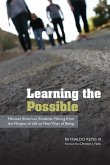The children of Mexican immigrant families are the fastest growing population in American schools today. Education can be the key to a better quality of life, especially for a population that faces breathtakingly high poverty rates and few other opportunities for social mobility. But these children are too frequently considered at risk academically. What more can be done to help them succeed? Mexican Roots, American Schools offers a fresh take on this timely and critically important issue by focusing on the first years of elementary school and the complex interplay of learning with other aspects of children's lives. Its social policy recommendations will be essential reading for educators, policymakers, and parents alike. Based on the first-ever national study of the school readiness of Mexican immigrant children, this book examines how various aspects of their lives--including health, the home environment, and childcare arrangements--help or hurt their academic performance. Drawing a comprehensive picture, it shows that these children start school behind their peers and only fall farther behind over the years. The author forcefully maintains that this situation does not need to continue. Crosnoe outlines which factors make the most difference, and recommends policy initiatives that would help change things. In addressing educational inequality, we need to target the earliest years of school and pre-school programs, offer resource centers and services for students and parents, and consider how health and home inevitably seep their way into the schools.








